
We speak with Pulitzer Prize-winning reporter Joshua Kaplan about his latest blockbuster article for ProPublica chronicling the rise of a “freelance vigilante” through the ranks of the right-wing militia movement in an effort to surveil and disrupt their operations. Kaplan’s source, a wilderness survival trainer named John Williams, says he went undercover after being shocked by the January 6 insurrection, when members of the Proud Boys, Oath Keepers and other armed right-wing groups led the riot at the U.S. Capitol. “He’s an extraordinarily talented liar,” Kaplan says of Williams. “These militia guys loved him.” Williams would eventually gain the trust of senior leaders in Utah and beyond, collecting information that revealed a sprawling extremist movement with connections to law enforcement, lawmakers and more. Kaplan says Williams’s infiltration revealed the militia movement is surging across the country, despite the failed 2021 insurrection. Now with Donald Trump promising to pardon many of the Capitol riot participants, this same movement appears set to expand even further over the next few years. “The ramifications could be massive,” says Kaplan. “They have the potential to trigger a renaissance for militant extremists.”
Transcript
AMY GOODMAN: Congress has certified Donald Trump as the winner of the 2024 presidential election. On Monday, Vice President Kamala Harris oversaw the process of certifying her own defeat.
VICE PRESIDENT KAMALA HARRIS: Donald J. Trump of the state of Florida has received 312 votes. Kamala D. Harris — Kamala D. Harris of the state of California has received 226 votes. … This announcement of the state of the vote by the president of the Senate shall be deemed a sufficient declaration of the persons elected president and vice president of the United States, each for a term beginning on the 20th day of January, 2025.
AMY GOODMAN: Republican House Speaker Mike Johnson grinned as he sat behind Kamala Harris.
The certification took place on January 6, formerly a day of unremarkable procedure and four years to the day after a violent mob of Trump supporters smashed their way into the Capitol demanding then-Vice President Mike Pence refuse to certify Joe Biden’s win. This comes as people who went to jail for their role in January 6 are asking President-elect Trump for a full and complete presidential pardon, including far-right Proud Boys leader Enrique Tarrio, who was convicted of seditious conspiracy.
For more, we’re joined by Joshua Kaplan, Pulitzer Prize-winning reporter for ProPublica, who covered the January 6,[ 2021], riot at the U.S. Capitol, has published a major new exposé headlined “The Militia and the Mole.” His related piece in August is headlined “Armed and Underground: Inside the Turbulent, Secret World of an American Militia.” His new piece is based on material provided by a wilderness survival trainer named John Williams, who was upset by January 6 and decided to go undercover in the same militia movement. He gathered two years of material, brought it to Kaplan to report on it. On Monday, Williams released another giant trove of materials on a website called Distributed Denial of Secrets. For more, we’re joined by Josh Kaplan in our New York studio.
Welcome back to Democracy Now! It’s great to have you with us. Talk about the significance of yesterday, where you were as you covered January 6th, and then who exactly John Williams is and the significance of his revelations to you, Josh.
JOSHUA KAPLAN: Absolutely. So, I mean, after January 6, which, I think it’s easy to forget at this point, was an incredibly violent day — I’ve stood on the porches of Capitol Police members who adore Trump but were just shaken by the beatings they saw that day, the attacks they saw on their colleagues. And after January 6, history would have suggested, and a lot of militia leaders even thought, that the movement may not survive, that the backlash would be so intense that they, the militias, would go extinct for an extended period of time. And they started to resurge in the years since and expanded at dramatic pace because — in large part, this is, in some, because of the policies of social media companies, but it’s also because Trump and other prominent Republicans have embraced the January 6 rioters as patriots and political prisoners. And that’s given the kind of license for these — for people to join these groups again and to expand rapidly.
And one thing that’s changed since January 6 is that militias have become much more careful at keeping their activities underground. And these files that Williams provided give this incredibly candid, detailed window inside this underground, and they reveal how these groups have united convicted criminals with doctors, government attorneys, active-duty police officers and U.S. soldiers.
AMY GOODMAN: And we know there were a number of active-duty police officers and veterans and soldiers at January 6 in the insurrection.
JOSHUA KAPLAN: Absolutely. No, they were disproportionately represented in that and in militias.
AMY GOODMAN: And at the same time, you have 140 Capitol and Metropolitan police who were injured in this attack.
JOSHUA KAPLAN: Absolutely, yes. And then, also, one thing that came out in these files is the dangerous vigilante operations these militias have still been doing, that they had managed to keep a secret. And that ranges from armed patrols at the border rounding up migrants to trying to crack down on voters casting absentee ballots, surveillance of local journalists and activists, assaulting Black Lives Matter protesters, and then, lastly, in these files there’s this constant drumbeat of incredibly heated debate over whether they should escalate things even further and commit acts of mass political violence.
AMY GOODMAN: So, you write, “The documents laid out a remarkable odyssey. Posing as an ideological compatriot, [John] Williams had penetrated the top ranks of two of the most prominent right-wing militias in the country.” So, tell us who John Williams is. Talk about how you came in contact with him, why he gave you so much information over the years and now has himself released a trove of information just yesterday, and who the groups are he was working with, from AP3 to a number of these groups.
JOSHUA KAPLAN: Absolutely. So, he, John Williams, he’s a loner. He’s extremely intelligent, well read, introspective. He’s also extraordinarily intense about almost every aspect of his life. And he’s had a — he had a tumultuous upbringing. In young adulthood, he was convicted of a series of crimes that led to him spending three years in prison.
AMY GOODMAN: He lived where? Grew up?
JOSHUA KAPLAN: He lived in Utah. That’s where he infiltrated these groups. And he, after he got out of prison, became a wilderness survival instructor. And that is how, he says, he first came in contact with these groups. They had hired him for training. He tried to move on. And after January 6, he was outraged and ashamed that he had helped them in some small way. And he thought that, as he tells it, that he — that countless people would respond to this attack with aggressive action. And so he decided to reach back out and try to do an undercover operation of his own devising as kind of a freelance vigilante.
AMY GOODMAN: As a freelance vigilante and kind of journalist.
JOSHUA KAPLAN: Yes, yes. No, absolutely. And he didn’t have a plan at first. But he is — I mean, another thing to know about John is that he’s an extraordinarily talented liar. I mean, that was the key to why he was so effective here. But I was able to authenticate these files he had very carefully —
AMY GOODMAN: Now, he reached out to a number of journalists, but you responded.
JOSHUA KAPLAN: Yes, yes. And so, my relationship started with him towards the end of his journey in these groups. And I received this mysterious anonymous email that he had sent to an array of reporters. And he didn’t in this email say, “I’m an infiltrator who’s gotten inside these groups.” He was much more vague. But there was something intriguing about it. I responded. And to be honest, I wasn’t expecting much at first. I was skeptical. But we spoke a handful of times over encrypted calls, and then he sent me these files.
AMY GOODMAN: So, talk about AP3. Talk about the Proud Boys. Talk about his rise in the militia movement in Utah even as he is exposing it.
JOSHUA KAPLAN: Yes. So, AP3, it’s American Patriots Three Percent. This is a — you know, people might be familiar with the Three Presenters. And really, the largest Three Percenter group in the country for a long time has been AP3. And it’s one of the largest militias in the U.S.
AMY GOODMAN: And explain why it’s 3%. What does that stand for?
JOSHUA KAPLAN: That’s based on the claim that only 3% of Americans fought in the American Revolution. And so, it’s this idea that a very small group of dedicated people can stand up to tyranny, which is what they see in kind of liberal governance.
And he was able to — you know, John was so successful at this that he ultimately got the head of the group’s — of AP3’s Utah chapter fired and then convinced people to put John in his place. So he was leading that group. He was sleeping in the home of the new leader of the Oath Keepers, after the previous leader, the founder, went to prison for — was sentenced for seditious conspiracy for conspiring to violently overthrow the government on January 6, and he was going through this guy’s files another night. I mean, it’s amazing. I listened to these tapes, and I spent an enormous amount of time authenticating them. And he sounded like a completely different person on that call, just a brand-new personality from the John I was speaking to on the phone. And these militia guys loved him. And it enabled him to lie and manipulate his way into the heart of several of these groups.
AMY GOODMAN: So, talk about how the groups interact. And also, he was almost exposed when he actually reached out to warn a journalist that they were a target.
JOSHUA KAPLAN: Yes. So, there’s a lot of interplay among these groups. I mean, I think that there — I think a lot of laypeople think of them like gangs, like you’re a Proud Boy, so you’re forever a Proud Boy. They’re much more porous than that. People kind of cycle — members will cycle between them, one group. And the missions of each are kind of ill-defined. It’s part of why they’ve been able to grow so much. There’s shared grievances, but when it comes to questions of “Are we trying to overthrow the government, or are we trying to just police the border in our own dangerous vigilante operations, or are we trying to get involved in local politics?” those aren’t questions that have predefined answers, and so there’s constant debate about them. And it enables them to, in some ways, especially at the local level, bridge more mainstream conservative politics and more violent action. But the throughline in all of these is paramilitary training, intense firearms training, where they will do things like practice storming buildings with semiautomatic rifles or doing an ambush with explosives.
AMY GOODMAN: What did he learn about the Salt Lake Tribune reporter?
JOSHUA KAPLAN: Yes, so, the reporter — so, he was on a call at one point, and there was a conversation about — some woman started speaking about how there was a journalist in her small town who was covering the town’s vice mayor, who was under fire for a homophobic remark. And she thought this journalist was leading a secret far-left plot, and also was her neighbor, and she thought he had been trying to harass her by leaving dead animals in her lawn. And so, she seemed in the grip of something. And then, at the end of this call, she said, “I think I need to settle a score with this guy.”
AMY GOODMAN: They’re still neighbors.
JOSHUA KAPLAN: They’re still neighbors. “It’s getting to the deep state local level. It’s got to be stopped.” And this scared John. You know, he thought — felt obligated to warn this journalist, and so he sent him an anonymous email. The next morning, he saw an article posted online. The journalist had written 500 words about this experience and this strange email he had gotten, and it had a screenshot of the note. And there had been some lines pointing — there was a lot of evidence pointing that John was the guy who leaked this. And so, he thought, “I’m finally found out. People are going to know I’m the mole. I’m going to go on the run.” And so he picks up his life and flees to the desert, so he can disappear for at least several weeks.
AMY GOODMAN: So, right now we’ve just passed January 6th. President-elect Trump has called it a “day of love.” Enrique Tarrio, on January 6, who was convicted and imprisoned for seditious conspiracy, head of the Proud Boys, has asked for a pardon. He actually wasn’t there on January 6th. He was, what, picked up before —
JOSHUA KAPLAN: Yeah.
AMY GOODMAN: — January 6th? But explain the significance of that and where the Proud Boys fit into this story, and then the larger question. You have the vigils outside the jail where January 6 insurrectionists are held. There was a demand for a sort of global pardon of the protesters. President Trump, when asked by journalists whether he’s going to pardon them, he said, you know, not in the first 90 days, 30 days, like on first day, in the first minutes. Not clear if it’s going to be a blanket pardon or if — he’s at other times said it’s going to be — he’s going to look each and every case.
JOSHUA KAPLAN: Yeah. I mean, so, the Proud Boys, to answer your first question, they’re another militia group that is very much a kind of — sees itself as an arm of Trump, as kind of the — Trump’s street fighters, essentially. And their trademark, until January 6, was fighting with activists in the street and kind of attacking people at left-wing protests. And they, according to the Department of Justice, were really, as much as any group, what led the charge that enabled the Capitol riot to happen, enabled the Capitol to be stormed.
And so, these pardons, I mean, the ramifications could be massive. They have the potential to trigger a renaissance for militant extremists, because there’s really — there’s no precedent for this kind of message of protection and support coming from the White House. And so, if these pardons are as sweeping as Trump has repeatedly suggested they might be, if they include those who assaulted police officers that day, how that will be interpreted is that you can commit even serious crimes and not go punished, not be punished for that, as long as you’re doing it for the, quote-unquote, “right cause.”
AMY GOODMAN: And finally, going back to that affiliation with law enforcement, John Williams talking about how others in AP3 and other groups kept telling him, “You can contact your local sheriff.”
JOSHUA KAPLAN: Yeah. I mean, this was a — these groups view that as critical to their success, having allies in law enforcement. You know, the signature of these groups is putting themselves in incredibly vulnerable situations with a lot of guns. And so, they want to have police, if not actively help them, at least leave them alone, see them as a friend.
AMY GOODMAN: They have a spreadsheet of the sheriffs that are friendly to them.
JOSHUA KAPLAN: They have a — yes, they have a spreadsheet. Every member in AP3 got a spreadsheet of the sheriffs in their state, was told to reach out to them, mark who’s friendly, who’s not. And they have these very detailed and kind of business school-esque tactics for buttering up police officers, buttering up sheriffs, trying to kind of pitch themselves. It’s an incredibly organized effort, that we don’t — and in some cases has been quite successful, it seems. And we don’t really normally get a view of that playbook, of those tactics, and how — the sheer amount of work that they put into this.
AMY GOODMAN: And finally, as we look at what happened in Las Vegas with the Green Beret, active-duty, who shot himself in his Tesla — you could call it a tank — exploded in front of the Trump Hotel, as well as the Army veteran in New Orleans, these what look like lone wolf military guys, heavily armed, did you see, as you were exploring this terrain with John Williams, people like that?
JOSHUA KAPLAN: Yes. I mean, this is certainly, and it’s not — you know, I don’t want to get into specific incidents that I haven’t reported. But, I mean, there have been high-profile — nothing like the Las Vegas attack, but high-profile incidents in the 2022 midterms, for instance, of a man doing an armed stakeout of a ballot box and getting in a confrontation with a woman, sparked a national news cycle. He was an AP3 leader, doing an AP3 operation. And he was not linked back to the group or to any kind of organized effort until John came along.
And so, certainly, these people right now may well be lone wolves. I have no reason to suggest otherwise. And there’s — you know, people can be radicalized online right now. But there’s also this long history of — and it’s, I think, become an even more concerted effort, potentially, in recent years — of people committing acts of violence who look like lone wolves, take care to look like lone wolves, and then it comes out very long after the fact that they actually had — were working with or had a very long history with organized militia groups.
AMY GOODMAN: Well, I want to thank you for being with us and for doing this deep investigation. Joshua Kaplan, Pulitzer Prize-winning reporter for ProPublica, who covered the January 6, 2021, insurrection at the U.S. Capitol, has a major new exposé. We’ll link to it. It’s headlined “The Militia and the Mole.”
When we come back, we speak with the acclaimed Palestinian poet Mosab Abu Toha. His latest piece in The New Yorker, “Requiem for a Refugee Camp.” Stay with us.

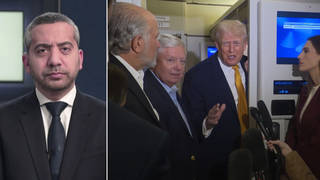
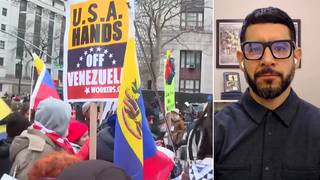

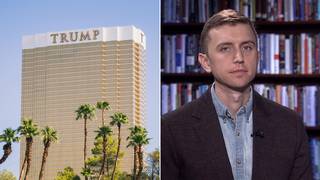

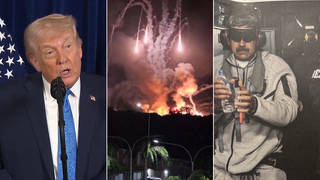
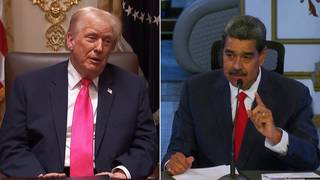
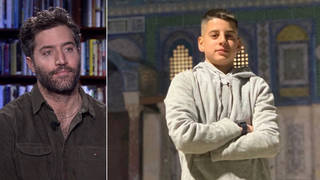



Media Options